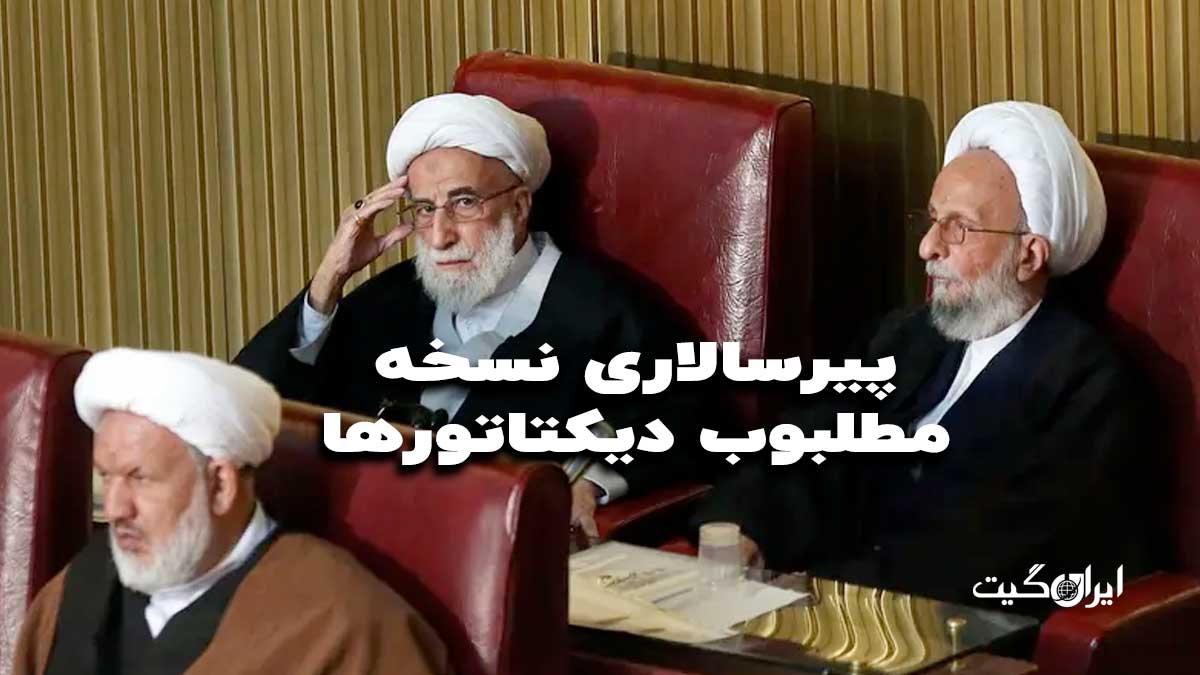The desired version of dictatorship
According to Iran Gate, the desired version of dictatorship is called Gerontocracy, which means the rule of the elderly. This term was used in ancient Greece to refer to a specific type of government, but nowadays it is used to describe a situation that any government can fall into.
In Gerontocracy, age and experience are considered sacred or honorable for religious or customary reasons, and therefore, the elderly have priority in decision-making. Consequently, in the allocation of political and managerial positions, the elderly are preferred over the young, and the seats of power are mostly held by the elderly. In ancient Greece, in the city-state of Sparta, members of the ruling council had to be at least 60 years old.
Authoritarianism essentially stems from a fundamental perspective on human life, which can be summarized as the sanctification of experience. Therefore, authoritarianism does not only imply political implications, but it can also prevail in the general culture. Authoritarianism is certainly one of the foundations of conservatism, but revolutionary political regimes can also fall into its trap. For example, in the last two decades of the twentieth century, the Communist Party of China was dominated by a group of eight individuals, who were labeled the ‘Eight Immortals’ by Western media due to their advanced age. This term originates from Chinese mythology.
Mao, the leader of communist China, was 82 years old at the time of his death and only relinquished power upon his demise. After him, Deng Xiaoping came to power, who was also 82 years old at the time of his death. Similarly, the last three leaders of the Soviet Union, Brezhnev, Andropov, and Chernenko, died in 1982, 1984, and 1985 respectively due to old age and stepped down from power. Authoritarianism in the Soviet Union began in the 1970s and played a significant role in the survival of the Communist Party amidst the social transformations of the country. In the 1980s, the average age of members of the Central Committee of the Communist Party of the Soviet Union was 70 years old.
Critics of the communist regime in China sarcastically referred to the elderly members of the leadership as ‘eighties and seventies’ because they made decisions about the retirement of sixty-year-olds.
In current America, the competition between Biden and Trump in the 2020 presidential election, as well as their potential rivalry in the 2024 election, definitely show signs of gerontocracy. In tribal societies, the natural right of governance was often in the hands of the elderly. Similarly, in more advanced societies of the ancient world, older individuals were usually in positions of power, reflecting the cultural agreement with gerontocracy.
However, the concept of gerontocracy originated in ancient Greece. Plato’s famous statement, ‘The older gives orders and the younger obeys,’ is the shortest and most concise definition of gerontocracy. As this idea was ingrained in the culture of various societies, gerontocracy extended beyond the realm of government and applied to different areas of society, including tribes, families, and households, as an established principle.
In fact, in the ancient world, authority was greater and the negation of this authority was only justified in exceptional circumstances. This principle was also one of the foundations of the family, which is why in the modern world, where the democratization of the family structure is being discussed, legal protections have been put in place to safeguard children from potential harm caused by parental decisions.
In other words, democratization is not only limited to the realm of government and politics, but society and culture must also embrace democratic values. The most important indication of democracy is the distribution of power. This means that if a ruler is authoritarian, they are obliged to distribute their power through political representatives of the people. Likewise, people should be prepared to distribute their power to their subordinates in various aspects of their social and personal lives.
And since power lies with the parents in the family, the democratization of the family structure requires that power is not concentrated in the hands of the parents. To achieve this situation in democratic and progressive societies, laws have been enacted to limit parental power and increase the power of children.
Although it may seem that parental authority over children never completely disappears for emotional, physiological, and other reasons, it is necessary to limit the power of parents and distribute power within the family to reduce authoritarianism, which means greater decision-making and lesser obedience.
However, completely eliminating authoritarianism is a cultural and educational matter, and its requirement is the strengthening of respect for children and young people. Although conservatives and other defenders of authoritarianism emphasize the importance of experience and consider tradition as the result of accumulated experience and, in fact, emerged from centuries of rationality, they oppose the disregard for the reason of past generations. But critics of authoritarianism believe that democracy means the negation of the rule of the dead over the living.
Therefore, whatever is based on tradition and the reason of the ancients is not necessarily worthy of obedience. Following it depends on its approval by the reason of today. For this reason, if in the old political and family structures there was a special emphasis on the rule of the elders and lesser obedience, such a principle is not acceptable in the new democratic world.
Just as rulers must embrace democracy, it is also important for parents and the family structure to become democratic. Otherwise, the future of many young people will be crushed under the wheel of greater powers.
Disempowering the elderly and older individuals becomes more significant when we remember that as people age, their ability to abandon vices and shortcomings decreases. As Maulana says, humans are like thorn removers. If they do not remove their vices in their youth and middle age, they will not be able to do so in old age because those vices have become ingrained in them and their ability to overcome them diminishes over time.
Elon Musk, a well-known capitalist, also explains why he does not financially support long-term or eternal life projects. He sees these projects as hindrances to societal progress and says that people mostly do not change their opinions but rather hold onto their beliefs until death.
Therefore, if their death is delayed or never occurs, they become obstacles to societal transformation and progress, especially if they hold positions of political power and decision-making authority in societies filled with young people who have different and fresher perspectives.
English
View this article in English


